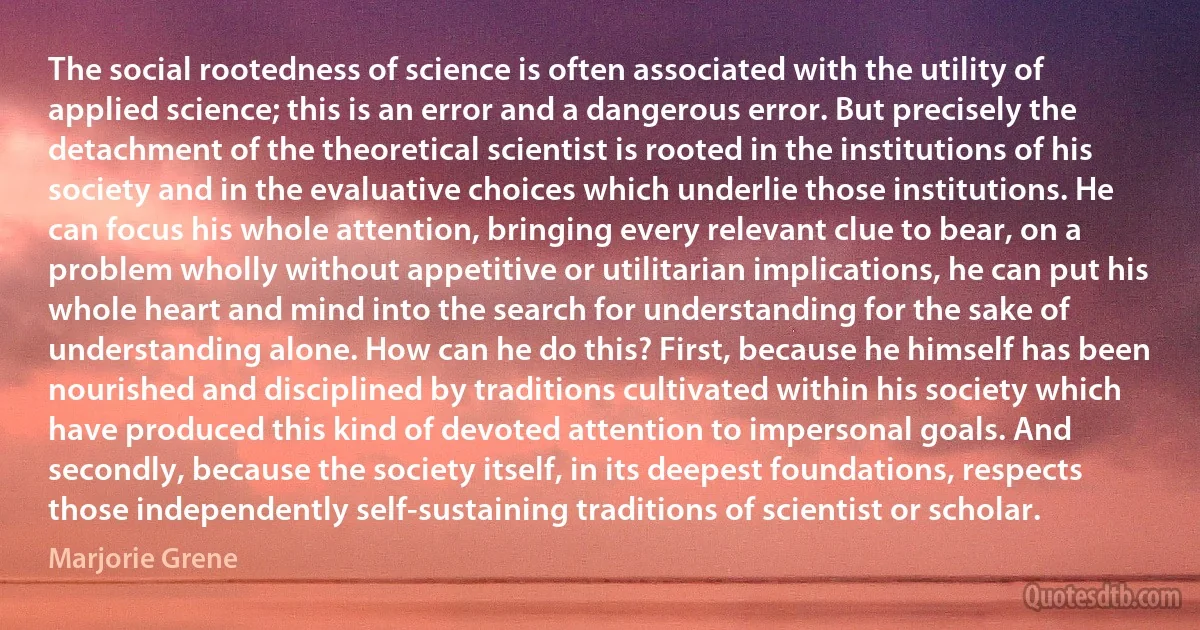
The social rootedness of science is often associated with the utility of applied science; this is an error and a dangerous error. But precisely the detachment of the theoretical scientist is rooted in the institutions of his society and in the evaluative choices which underlie those institutions. He can focus his whole attention, bringing every relevant clue to bear, on a problem wholly without appetitive or utilitarian implications, he can put his whole heart and mind into the search for understanding for the sake of understanding alone. How can he do this? First, because he himself has been nourished and disciplined by traditions cultivated within his society which have produced this kind of devoted attention to impersonal goals. And secondly, because the society itself, in its deepest foundations, respects those independently self-sustaining traditions of scientist or scholar.
Marjorie GreneRelated topics
attention bear clue detachment error heart impersonal kind mind problem sake science search underlie understanding utilitarian utilityRelated quotes
Development means a capacity for self-sustaining growth. It means that an economy must register advances which in turn will promote further progress. The loss of industry and skill in Africa was extremely small, if we measure it from the viewpoint of modern scientific achievements or even by standards of England in the late eighteenth century. However, it must be borne in mind that to be held back at one stage means that it is impossible to go on to a further stage. When a person was forced to leave school after only two years of primary school education, it is no reflection on him that he is academically and intellectually less developed than someone who had the opportunity to be schooled right through to university level. What Africa experienced in the early centuries of trade was precisely a loss of development opportunity, and this is of the greatest importance.

Walter Rodney
The chief distinction in the intellectual powers of the two sexes is shewn by man attaining to a higher eminence, in whatever he takes up, than woman can attain - whether requiring deep thought, reason, or imagination, or merely the use of the senses and hands. If two lists were made of the most eminent men and women in poetry, painting, sculpture, music, - comprising composition and performance, history, science, and philosophy, with half-a-dozen names under each subject, the two lists would not bear comparison. We may also infer, from the law of the deviation of averages, so well illustrated by Mr. Galton, in his work on 'Hereditary Genius,' that if men are capable of decided eminence over women in many subjects, the average standard of mental power in man must be above that of woman. ... Thus man has ultimately become superior to woman.

Charles Darwin
A dangerous tendency has shown itself of late among many of our personnel -- an unwillingness to share weal and woe with the masses, a concern for personal fame and gain. This is very bad. One way of overcoming it is to streamline our organizations in the course of our campaign to increase production and practice economy, and to transfer cadres to lower levels so that a considerable number will return to productive work. We must see to it that all our cadres and all our people constantly bear in mind that ours is a large socialist country but an economically backward and poor one, and that this is a very big contradiction. To make China prosperous and strong needs several decades of hard struggle, which means, among other things, pursuing the policy of building up our country through diligence and thrift, that is, practicing strict economy and fighting waste.

Mao Zedong
The advance of liberalism, so-called, in Christianity, during the past fifty years, may fairly be called a victory of healthy-mindedness within the church over the morbidness with which the old hell-fire theology was more harmoniously related. We have now whole congregations whose preachers, far from magnifying our consciousness of sin, seem devoted rather to making little of it. They ignore, or even deny, eternal punishment, and insist on the dignity rather than on the depravity of man. They look at the continual preoccupation of the old-fashioned Christian with the salvation of his soul as something sickly and reprehensible rather than admirable; and a sanguine and 'muscular' attitude, which to our forefathers would have seemed purely heathen, has become in their eyes an ideal element of Christian character. I am not asking whether or not they are right, I am only pointing out the change.

William James
The general character and disposition of the Rationalist are, I think, not difficult to identify. At bottom he stands (he always stands) for independence of mind on all occasions, for thought free from obligation to any authority save the authority of 'reason'. His circumstances in the modern world have made him contentious: he is the enemy of authority, of prejudice, of the merely traditional, customary or habitual. His mental attitude is at once sceptical and optimistic: sceptical, because there is no opinion, no habit, no belief, nothing so firmly rooted or so widely held that he hesitates to question it and to judge it by what he calls his 'reason'; optimistic, because the Rationalist never doubts the power of his 'reason' (when properly applied) to determine the worth of a thing, the truth of an opinion or the propriety of an action.

Michael Oakeshott
